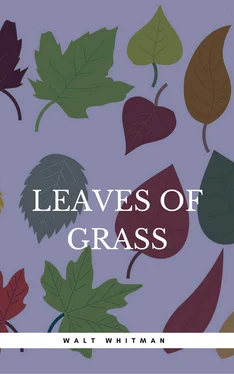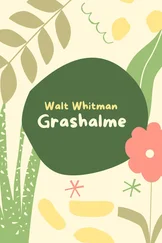Walt Whitman - Leaves of Grass
Здесь есть возможность читать онлайн «Walt Whitman - Leaves of Grass» — ознакомительный отрывок электронной книги совершенно бесплатно, а после прочтения отрывка купить полную версию. В некоторых случаях можно слушать аудио, скачать через торрент в формате fb2 и присутствует краткое содержание. ISBN: , Жанр: Языкознание, Критика, на английском языке. Описание произведения, (предисловие) а так же отзывы посетителей доступны на портале библиотеки ЛибКат.
- Название:Leaves of Grass
- Автор:
- Жанр:
- Год:неизвестен
- ISBN:9782377930524
- Рейтинг книги:4 / 5. Голосов: 1
-
Избранное:Добавить в избранное
- Отзывы:
-
Ваша оценка:
- 80
- 1
- 2
- 3
- 4
- 5
Leaves of Grass: краткое содержание, описание и аннотация
Предлагаем к чтению аннотацию, описание, краткое содержание или предисловие (зависит от того, что написал сам автор книги «Leaves of Grass»). Если вы не нашли необходимую информацию о книге — напишите в комментариях, мы постараемся отыскать её.
Leaves of Grass — читать онлайн ознакомительный отрывок
Ниже представлен текст книги, разбитый по страницам. Система сохранения места последней прочитанной страницы, позволяет с удобством читать онлайн бесплатно книгу «Leaves of Grass», без необходимости каждый раз заново искать на чём Вы остановились. Поставьте закладку, и сможете в любой момент перейти на страницу, на которой закончили чтение.
Интервал:
Закладка:
I do not affirm what you see beyond is futile . . . . I do not advise you to stop,
I do not say leadings you thought great are not great,
But I say that none lead to greater or sadder or happier than those lead to.
Will you seek afar off? You surely come back at last,
In things best known to you finding the best or as good as the best,
In folks nearest to you finding also the sweetest and strongest and lovingest,
Happiness not in another place, but this place . . not for another hour, but this hour,
Man in the first you see or touch . . . . always in your friend or brother or nighest neighbor . . . . Woman in your mother or lover or wife,
And all else thus far known giving place to men and women.
When the psalm sings instead of the singer,
When the script preaches instead of the preacher,
When the pulpit descends and goes instead of the carver that carved the supporting desk,
When the sacred vessels or the bits of the eucharist, or the lath and plast, procreate as effectually as the young silversmiths or bakers, or the masons in their overalls,
When a university course convinces like a slumbering woman and child convince,
When the minted gold in the vault smiles like the nightwatchman’s daughter,
When warrantee deeds loafe in chairs opposite and are my friendly companions,
I intend to reach them my hand and make as much of them as I do of men and women.
Leaves of Grass.
1855:3
To think of time . . . . to think through the retrospection,
To think of today . . and the ages continued henceforward.
Have you guessed you yourself would not continue? Have you dreaded those earth-beetles?
Have you feared the future would be nothing to you?
Is today nothing? Is the beginningless past nothing?
If the future is nothing they are just as surely nothing.
To think that the sun rose in the east . . . . that men and women were flexible and real and alive . . . . that every thing was real and alive;
To think that you and I did not see feel think nor bear our part,
To think that we are now here and bear our part.
Not a day passes . . not a minute or second without an accouchement;
Not a day passes . . not a minute or second without a corpse.
When the dull nights are over, and the dull days also,
When the soreness of lying so much in bed is over,
When the physician, after long putting off, gives the silent and terrible look for an answer,
When the children come hurried and weeping, and the brothers and sisters have been sent for,
When medicines stand unused on the shelf, and the camphor-smell has pervaded the rooms,
When the faithful hand of the living does not desert the hand of the dying,
When the twitching lips press lightly on the forehead of the dying,
When the breath ceases and the pulse of the heart ceases,
Then the corpse-limbs stretch on the bed, and the living look upon them,
They are palpable as the living are palpable.
The living look upon the corpse with their eyesight,
But without eyesight lingers a different living and looks curiously on the corpse.
To think that the rivers will come to flow, and the snow fall, and fruits ripen . . and act upon others as upon us now . . . . yet not act upon us;
To think of all these wonders of city and country . . and others taking great interest in them . . and we taking small interest in them.
To think how eager we are in building our houses,
To think others shall be just as eager . . and we quite indifferent.
I see one building the house that serves him a few years . . . . or seventy or eighty years at most;
I see one building the house that serves him longer than that.
Slowmoving and black lines creep over the whole earth . . . . they never cease . . . . they are the burial lines,
He that was President was buried, and he that is now President shall surely be buried.
Cold dash of waves at the ferrywharf,
Posh and ice in the river . . . . half-frozen mud in the streets,
A gray discouraged sky overhead . . . . the short last daylight of December,
A hearse and stages . . . . other vehicles give place,
The funeral of an old stagedriver . . . . the cortege mostly drivers.
Rapid the trot to the cemetery,
Duly rattles the deathbell . . . . the gate is passed . . . . the grave is halted at . . . . the living alight . . . . the hearse uncloses,
The coffin is lowered and settled . . . . the whip is laid on the coffin,
The earth is swiftly shovelled in . . . . a minute . . no one moves or speaks . . . . it is done,
He is decently put away . . . . is there anything more?
He was a goodfellow,
Freemouthed, quicktempered, not badlooking, able to take his own part,
Witty, sensitive to a slight, ready with life or death for a friend,
Fond of women, . . played some . . eat hearty and drank hearty,
Had known what it was to be flush . . grew lowspirited toward the last . . sickened . . was helped by a contribution,
Died aged forty-one years . . and that was his funeral.
Thumb extended or finger uplifted,
Apron, cape, gloves, strap . . . . wetweather clothes . . . . whip carefully chosen . . . . boss, spotter, starter, and hostler,
Somebody loafing on you, or you loafing on somebody . . . . headway . . . . man before and man behind,
Good day’s work or bad day’s work . . . . pet stock or mean stock . . . . first out or last out . . . . turning in at night,
To think that these are so much and so nigh to other drivers . . and he there takes no interest in them.
The markets, the government, the workingman’s wages . . . . to think what account they are through our nights and days;
To think that other workingmen will make just as great account of them . . yet we make little or no account.
The vulgar and the refined . . . . what you call sin and what you call goodness . . to think how wide a difference;
To think the difference will still continue to others, yet we lie beyond the difference.
To think how much pleasure there is!
Have you pleasure from looking at the sky? Have you pleasure from poems?
Do you enjoy yourself in the city? or engaged in business? or planning a nomination and election? or with your wife and family?
Or with your mother and sisters? or in womanly housework? or the beautiful maternal cares?
These also flow onward to others . . . . you and I flow onward;
But in due time you and I shall take less interest in them.
Your farm and profits and crops . . . . to think how engrossed you are;
To think there will still be farms and profits and crops . . yet for you of what avail?
What will be will be well—for what is is well,
To take interest is well, and not to take interest shall be well.
The sky continues beautiful . . . . the pleasure of men with women shall never be sated . . nor the pleasure of women with men . . nor the pleasure from poems;
The domestic joys, the daily housework or business, the building of houses—they are not phantasms . . they have weight and form and location;
The farms and profits and crops . . the markets and wages and government . . they also are not phantasms;
The difference between sin and goodness is no apparition;
The earth is not an echo . . . . man and his life and all the things of his life are well-considered.
Интервал:
Закладка:
Похожие книги на «Leaves of Grass»
Представляем Вашему вниманию похожие книги на «Leaves of Grass» списком для выбора. Мы отобрали схожую по названию и смыслу литературу в надежде предоставить читателям больше вариантов отыскать новые, интересные, ещё непрочитанные произведения.
Обсуждение, отзывы о книге «Leaves of Grass» и просто собственные мнения читателей. Оставьте ваши комментарии, напишите, что Вы думаете о произведении, его смысле или главных героях. Укажите что конкретно понравилось, а что нет, и почему Вы так считаете.












